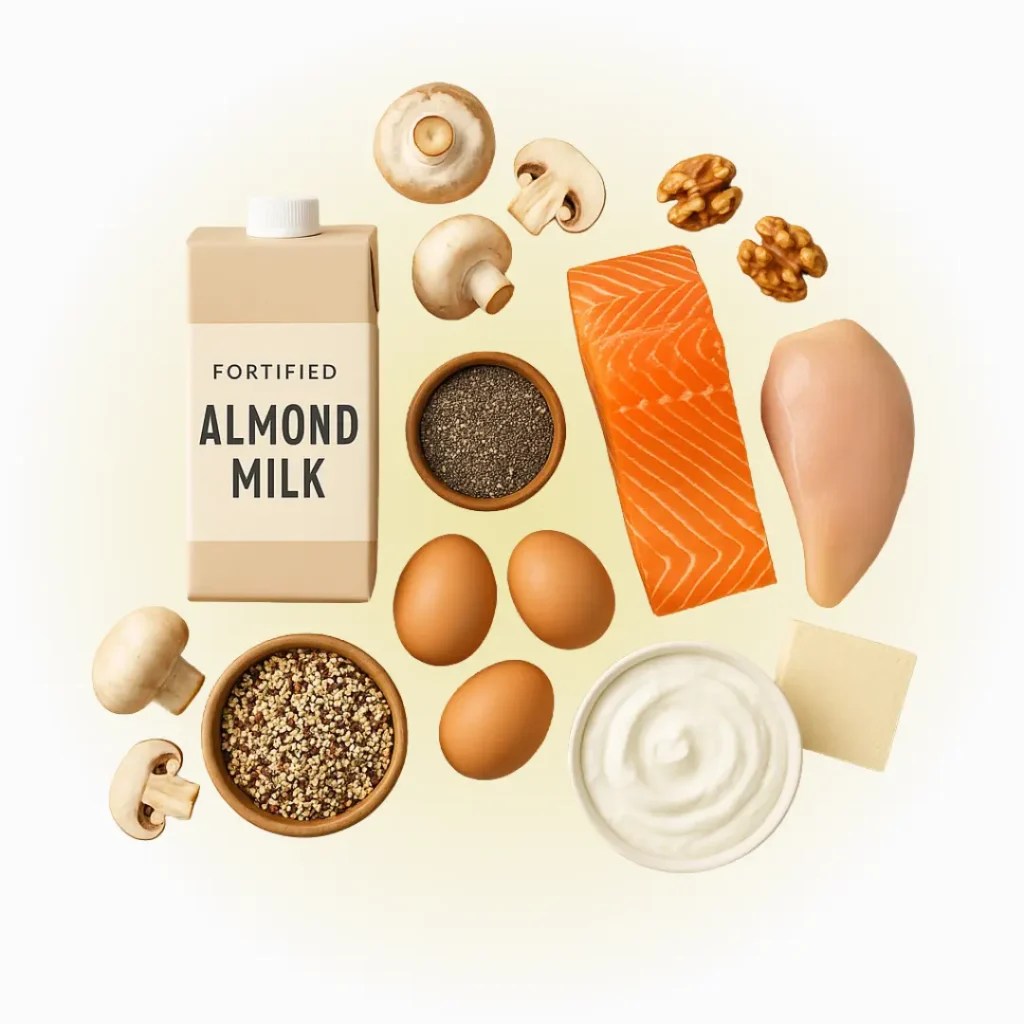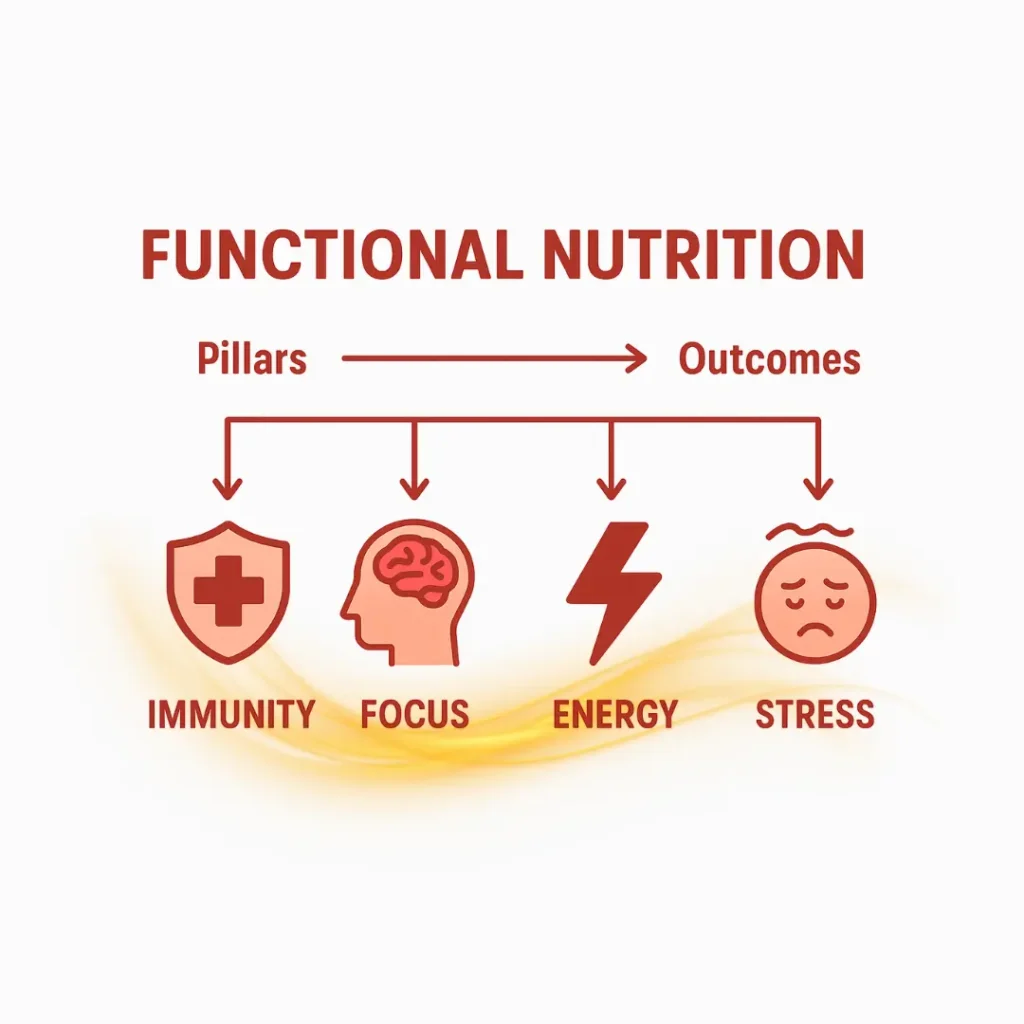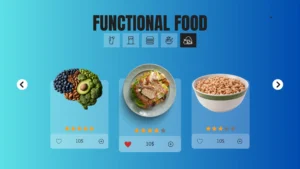Introduction
Functional nutrition is about eating with intention—choosing foods and add-ins that deliver body regulating nutrients for clear outcomes like focus, calm, and a diet for immune system boosting. This guide makes it practical: smarter swaps, safe basics, and snack ideas that travel.

What Is Functional Nutrition?
At its core, functional nutrition pairs whole-food foundations (plants, quality proteins, healthy fats) with targeted choices—like fortified staples, adaptogens, and nootropics—to support goals such as healthy eating for immune system resilience, steady energy, and cognitive clarity. Think food first, then use functional add-ons where they genuinely fill gaps.
Pillars to remember
- Balance: protein + fiber + healthy fats each meal.
- Quality: minimally processed; short ingredient lists.
- Personalization: match choices to your needs, tolerances, and goals.
- Consistency: small, repeatable habits > hero meals.

Fortified Foods: How to Choose Wisely
What “fortified” means: vitamins/minerals added to a food to replace processing losses or fill common gaps (e.g., vitamin D, iron, B-vitamins). Fortified options can help when sun exposure is low (vitamin D) or in plant-forward diets (B-12, iron in select products). The Nutrition Source
Smart picks
- Milk/alt-milk: vitamin D + calcium.
- Whole-grain cereals/oats: iron, B-complex (mind added sugar).
- Yogurt/kefir: sometimes vitamin D; seek lower added sugar.
- Iodized salt: a little goes a long way—don’t exceed sodium needs.
Label check: Look for meaningful % Daily Value, minimal added sugar/sodium, and pair fortified foods with whole foods for absorption (e.g., iron-fortified cereal + vitamin-C fruit).
Adaptogens: Stress Support & Safety
Adaptogens (e.g., ashwagandha, rhodiola, holy basil) are herbs associated with stress resilience. Early research suggests benefits for sleep and perceived stress, but quality and dosing vary. Safety first: short-term use of ashwagandha appears generally well tolerated; avoid during pregnancy/breastfeeding; check meds and liver considerations. Talk to your clinician if you have thyroid issues or are on interacting medications. Office of Dietary Supplements+1How to use: Start low, use reputable, third-party-tested products, and consider food-form options (teas, functional blends) over mega-doses.
Nootropics: Everyday Focus Boosters
You may already use gentle nootropics: caffeine (coffee/tea), L-theanine (tea), omega-3s (fatty fish), and polyphenol-rich berries. Pairing caffeine + L-theanine can support attention and reduce jittery edges for some people; evidence shows modest cognitive benefits in certain tasks. Timing matters—avoid late-day caffeine if it disturbs sleep. PMC+1
Build a Functional Day on a Plate
- Breakfast: Fortified oats cooked in fortified alt-milk + chia + berries; green tea (caffeine + L-theanine).
- Snack: Greek yogurt + seeds.
- Lunch: Salmon (omega-3) bowl with quinoa, greens, citrus vinaigrette.
- Snack: Edamame or a lower-sugar protein bar.
- Dinner: Tofu or chicken stir-fry, mixed veggies, brown rice; optional adaptogen tea in the evening.
- Hydration & timing: Space protein across the day; front-load caffeine before early afternoon. PMC

Voice-Search Q&A
Q: What is functional nutrition?
A: An approach to eating that combines whole-food basics with targeted choices (fortified foods, adaptogens, nootropics) to deliver body regulating nutrients for energy, focus, and an immune-supportive pattern.
Q: What’s a simple diet for immune system boosting?
A: Emphasize vitamin C produce (citrus, berries, peppers), vitamin D sources/fortified foods, zinc (seafood, beans, seeds), probiotic foods (yogurt/kefir), and steady protein at each meal.
Q: Are adaptogens safe?
A: Some (like ashwagandha) appear short-term tolerable for many, but quality varies and interactions exist—check with your clinician, especially for thyroid, liver, pregnancy, or meds. Office of Dietary Supplements
Q: What are easy protein snacks?
A: Greek yogurt, cottage cheese, edamame, roasted chickpeas, lower-sugar jerky or protein bars, and smoothies with fortified alt-milk.
Bottom Line
Functional nutrition isn’t about exotic powders—it’s about consistent, thoughtful choices: whole-food foundations, fortified helpers to fill gaps, adaptogens used carefully for stress, nootropics from everyday foods for focus, and protein snacks that keep energy steady. Personalize, read labels, and when in doubt, consult a qualified health professional. The Nutrition Source




